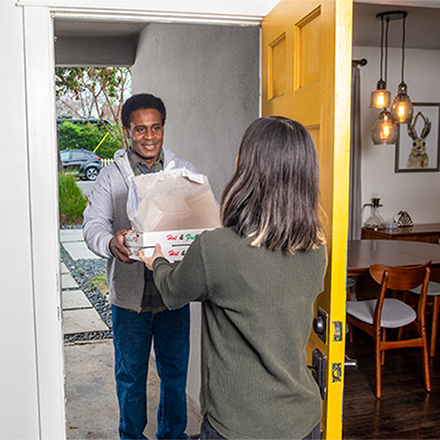- Insurance Guide
- Property Insurance
- Homeowners Insurance Vs. Home Warranty
Homeowners insurance vs. home warranty: What’s the difference?

Home is where the heart is. It’s also where almost everything you own happens to be located. That fridge you love. Your favorite burner on the stove top. The couch that sits just right. The vintage furniture that reminds you of someone you love. All in there. Learn how to help protect your home, your possessions, and your family with insurance options.
Options for Protecting Your Home
The first step in selecting coverage for your home is understanding what each type of insurance covers and its purpose. Homeowners insurance and home warranties are two distinct options that offer different benefits.
Homeowners insurance covers the entirety of a home’s structure as well as personal belongings inside the home following a covered event that is listed in the contract. Covered events, or "known perils," may include weather-related incidents and fires. Some policies may also cover damage or loss caused by burglary or vandalism.
Home warranty insurance covers repairs or replacements of a home’s major systems and appliances. Major kitchen appliances are generally protected, as well as washers and dryers. Some policies may also include HVAC systems, water heaters, plumbing, and electrical systems.
Understand homeowners insurance
Who is it for?
Every homeowner. If you own a home or are planning to buy one, homeowners insurance is an important consideration. In fact, homeowners insurance is almost always required if you are getting a mortgage from a lender. The lender will want you to have homeowners insurance to protect their investment in your property.
What is covered?
The home’s structure, including all exterior and interior fixtures and systems. The contents of the home are also covered, including all personal belongings.
Contracts generally cover weather-related damage and fires. Contracts may not include particular types of damage such as issues caused by normal wear and tear or pests. Contracts may also exclude damage caused by specific events like earthquakes or floods.
It is important to familiarize yourself with the details of your homeowners insurance contract. Generally, only listed events will be covered, so consumers should read policies carefully prior to signing. If anything is unclear, speak with a customer service representative or agent to be sure you understand what exactly is covered by your policy—and what is not covered. If there are considerably risks in your area from events not covered in your contract (such as an earthquake or flood), you may want to consider a separate policy specifically for that possibility.
When do you use it?
If a natural disaster or other event (or “peril”) listed in your contract causes damage to your home or belongings, you can file a claim with your homeowners insurance.
Understand home warranty insurance
Who is it for?
Any homeowner can get home warranty insurance. These policies may be particularly useful for homeowners with older homes containing systems or appliances that are nearing the end of their lifespan. Home warranties could also be an important consideration for homeowners who want to plan ahead to avoid having to buy big budget items like major appliances or HVAC systems outright if they fail. Finally, homeowners who do not have emergency budgets or significant savings set aside may want to consider home warranty insurance.
What is covered?
Home warranty contracts cover the damage or malfunction of home appliances or systems as a result of everyday use.
The exact items that are covered will be spelled out in the contract. It is essential to read the fine print in these contracts. Contracts typically include major appliances such as refrigerators, stoves, washers, dryers, dishwashers, and garbage disposals. Some policies also cover HVAC systems, plumbing, electrical, and hot water heaters. Home warranties will not cover damage as a result of neglected maintenance, improper installation, natural disasters, or a secondary event.
When do you use it?
When a system or appliance stops working properly, you file a claim with your insurance carrier. They will review your claim and likely send out a technician to evaluate, repair, and/or replace the item in question.
Combining coverage
If you want to ensure the highest level of protection for your home and its contents, you can get both homeowners insurance and home warranty insurance. Since the policies cover different items in various circumstances, it may be worth considering having both types of coverage depending on your specific resources and needs. Home sweet home may be even sweeter when you know it is protected.



